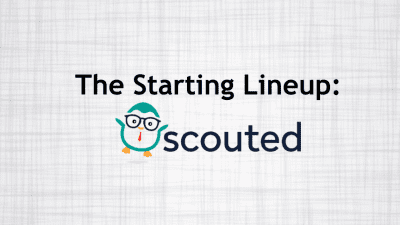I’ve written a lot about working at a startup. I’m a huge advocate when it comes to telling people that at some point in their life they should work for one – whether it be as an intern, your first job, or as a career change – because of the huge potential for growth and learning.
Yet oftentimes when I tell people that they should work for a startup, it’s easy to leave out the actual day to day, week to week, month to month aspects of the job. It’s without a doubt a shock to the system no matter at what stage someone is coming to a startup.
Also on Mediabistro


That being said, in this blog, I’ll do my best to explain what the first year of working at a startup is really like. I’ll throw in some insights, tips & tricks, and a few anecdotes to provide the most accurate and holistic view of my first year working at Scouted.
A humbling experience
Going into your first startup is a little like going into your freshman year of college. It’s a whole new experience with new and interesting people in a foreign place. You’re figuring out where your classes are, how to balance school and making friends, and realizing that there are a whole lot of different things to do.
My first year of working at Scouted was very similar to my first year at William & Mary (go Tribe!). I was pretty out of my depth for the first 6 months… I struggled, plain and simple. There was a lot of self-loathing and misunderstanding, stopping and starting, and doubt. I was trying to figure out what I was supposed to be doing and how to do it, all while on the job.
It wasn’t until 6 months in where I really started to realize I needed to calm down and take things one step at a time. I started to read more, sit in on other meetings, talk to mentors/people who were more knowledgeable than me. It was this realization that really resonated with me: I need to get over the hump and get my shit together, people were counting on me to do my job and do it well, one way or another.
[sc name=“Newsletter”]
New/learning things
Reading was critical in my first year on the job. Once I realized I didn’t know every single thing there was about my job, I made it my mission to learn everything that I needed to in order to be successful. On a typical day, anywhere from ⅓ to ½ my time was spent reading, listening, and consuming anything that was relevant to my job. I spent hours in the depths of marketing, business, and startup blogs.
As mentioned above, it was here I learned that people have spent a lot of time trying and failing in order to come up with successful methods. Testing was an integral part of being successful at a startup and failing (to an extent) was expected in order to find a greater outcome. By picking up these tips and tricks, I began applying them to my daily workflow, whether it be in metric tracking, building ad campaigns, or product improvements.
Testing and building
Testing has become and is an integral part of my life now – nothing I do now doesn’t start with some form of a test/experiment. But when I first started working, it took a while to realize that this was normal procedure. It wasn’t as simple as being told what to do it and how to do it, it was more along the lines of here is this very ambiguous goal figure out how we achieve it.
For example, one of my very ambiguous goals was “Double our users,” and as our marketing lead, this was an integral part of my job. Yet as a kid straight out of school – how the hell was I going to double our users while on a shoestring budget?
That’s where testing comes into play. I tried everything under the sun to see how we could double users. Everything from going to college campuses, Facebook ads, calling candidates to get them to convert, Linkedin, etc… I spent weeks working 80+ hours, and through a lot of trial and error, I was able to learn a lot of things and figure out a sustainable marketing strategy for Scouted with a lot of elements that we still use to this day.
Getting into a groove
Similar to a bicycle, I began to click through the gears and I found a rhythm that was sustainable and efficient. When I went to work every morning I knew what my, the team’s, and the overall business goals were. There’s something about this feeling of alignment that really gets me going. A collective and effective unit all simultaneously driving towards the same goal. My work felt meaningful and varied, there was no stagnation. Despite this being my first job I knew this was something special that a lot of people don’t get to experience, a job I truly enjoyed and loved.
Maybe I’m lucky, maybe it’s like this at a lot of startups, it’s hard to tell at times. Yet I knew that this was a role that I was really enjoying, I was learning, testing, and driving real business outcomes all within the space of a single year.
Autonomy and driving outcomes
When people think of startups, they think of a more open/relaxed culture, open-plan offices, cold brew and beer on tap. Yet there is a lot of hard work that goes on behind the scenes before any startup gets to that point. It took almost a year, but by this point, I was starting to enjoy more of the fruits of our labor. Things like working from home and team lunches were great, but the thing that I received by the end of my first year that I enjoyed the most was greater autonomy. 1 year out of college, I was given nearly free reign over an entire part of the business, something that is virtually unheard of anywhere else.
I want to remind you that while this experience may be shared at other companies, it definitely isn’t common. I was and am very fortunate to have founders that are extremely open to giving employees the opportunity to forge their own path and provide the tools necessary to be successful down that path.
Nonetheless, this is probably the best way I can describe the first year working at a startup, difficult yet rewarding.
Hopefully, my experience can offer some insight and informs you if you’re ever making the decision to work at a startup.










